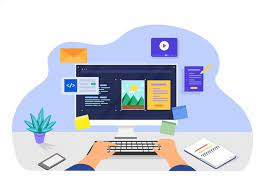The Evolution of Computers
Computers have come a long way since their inception, revolutionizing the way we live, work, and communicate. From the bulky and slow machines of the past to the sleek and powerful devices of today, the evolution of computers is a testament to human ingenuity and innovation.
Early computers were massive and required dedicated rooms to house them. They were slow, with limited processing power and memory. However, they laid the foundation for what was to come, paving the way for smaller, faster, and more efficient machines.
The introduction of personal computers in the 1970s marked a significant milestone in computer history. These compact devices brought computing power to individuals and businesses alike, changing the way we interact with technology on a daily basis.
With advancements in microprocessor technology, computers became smaller, faster, and more affordable. The rise of laptops, tablets, and smartphones further expanded the reach of computing devices, making them accessible to people around the world.
Today, we live in a world where computers are an integral part of our lives. From browsing the internet to conducting business transactions to connecting with loved ones across the globe, computers play a crucial role in virtually every aspect of modern society.
As we look towards the future, it is clear that computers will continue to evolve at a rapid pace. Artificial intelligence, quantum computing, and other cutting-edge technologies promise to push the boundaries of what is possible with computing devices.
One thing is certain: computers will remain at the forefront of technological innovation for years to come. As we embrace these advancements and harness their potential, we can look forward to a future where computers continue to shape our world in ways we have yet to imagine.
Essential Computer Maintenance Tips for Enhanced Security and Performance
- Regularly update your operating system and software for improved security and performance.
- Backup your important files and data to prevent loss in case of hardware failure or malware attacks.
- Use strong, unique passwords for all your accounts to enhance security.
- Avoid clicking on suspicious links or downloading attachments from unknown sources to prevent malware infections.
- Keep your computer clean by regularly removing dust from the vents and fans to prevent overheating.
- Consider investing in antivirus software to protect your computer from viruses and other online threats.
Regularly update your operating system and software for improved security and performance.
Regularly updating your operating system and software is crucial for enhancing the security and performance of your computer. Software updates often include patches for known vulnerabilities, which help protect your system from cyber threats. Additionally, updates can improve the overall functionality and efficiency of your computer, ensuring that it operates smoothly and optimally. By staying proactive with updates, you can safeguard your data and enjoy a more secure and seamless computing experience.
Backup your important files and data to prevent loss in case of hardware failure or malware attacks.
It is crucial to regularly back up your important files and data to safeguard against potential loss due to hardware failures or malware attacks. By creating backups on external drives, cloud storage, or other secure platforms, you can ensure that your valuable information remains safe and accessible even in the face of unexpected events. Prioritising regular backups is a proactive measure that can provide peace of mind and protect your digital assets from unforeseen risks.
Use strong, unique passwords for all your accounts to enhance security.
Using strong, unique passwords for all your accounts is a crucial step in enhancing your security online. By creating complex passwords that are different for each account, you significantly reduce the risk of unauthorized access to your personal information. Strong passwords should include a mix of letters, numbers, and special characters to make them harder to crack. Remembering multiple passwords may seem challenging, but the added layer of security they provide is well worth the effort. Stay vigilant and proactive in safeguarding your digital accounts by prioritizing strong and unique passwords for optimal protection against cyber threats.
Avoid clicking on suspicious links or downloading attachments from unknown sources to prevent malware infections.
To safeguard your computer from potential malware infections, it is crucial to exercise caution when browsing the internet. Avoid clicking on suspicious links or downloading attachments from unknown sources, as these actions can introduce harmful software onto your system. By staying vigilant and practising safe online habits, you can significantly reduce the risk of falling victim to cyber threats and ensure the security of your device and personal data.
Keep your computer clean by regularly removing dust from the vents and fans to prevent overheating.
To maintain the optimal performance of your computer, it is essential to keep it clean by regularly removing dust from the vents and fans. Over time, dust accumulation can clog the vents and fans, leading to overheating issues that can affect the overall functionality of your device. By taking the time to clean these components on a regular basis, you can prevent overheating and ensure that your computer operates smoothly and efficiently.
Consider investing in antivirus software to protect your computer from viruses and other online threats.
When it comes to safeguarding your computer from viruses and other online threats, investing in antivirus software is a wise decision. By having reliable antivirus protection in place, you can significantly reduce the risk of malware infections, data breaches, and other cybersecurity issues. Antivirus software works proactively to detect and eliminate threats before they can harm your system, providing you with peace of mind while using your computer for various online activities. Remember, prevention is key when it comes to protecting your digital assets, so consider prioritising the security of your computer with a reputable antivirus solution.

